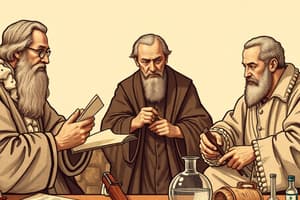Podcast
Questions and Answers
The history of scientific ______ is a history of the methodology of scientific inquiry, as differentiated from a history of science in general.
The history of scientific ______ is a history of the methodology of scientific inquiry, as differentiated from a history of science in general.
method
Science is easily recognizable to people largely because of the numerous ______ objects which are used all over.
Science is easily recognizable to people largely because of the numerous ______ objects which are used all over.
technological
Just like in this example, in almost all areas of modern life (Science, computer, forensic, health, weather, ______.etc).
Just like in this example, in almost all areas of modern life (Science, computer, forensic, health, weather, ______.etc).
agriculture
Courts do routinely rely to a large extent on the evidence of an expert ______ who is a scientist of some sort to convict or acquit someone of a crime.
Courts do routinely rely to a large extent on the evidence of an expert ______ who is a scientist of some sort to convict or acquit someone of a crime.
Science is often thought to be the ultimate form of objective and ______ inquiry and scientists are widely regarded as being able to gather any interpret evidence and use it to arrive at conclusions that are scientifically proven.
Science is often thought to be the ultimate form of objective and ______ inquiry and scientists are widely regarded as being able to gather any interpret evidence and use it to arrive at conclusions that are scientifically proven.
People are likely to seek or rely indirectly upon the ______ evidence and the opinions of scientists before making important decisions.
People are likely to seek or rely indirectly upon the ______ evidence and the opinions of scientists before making important decisions.
The ______ method is the foundation of what is today known as philosophy of science.
The ______ method is the foundation of what is today known as philosophy of science.
Philosophy of science is an important and fast-evolving ______ in its own right.
Philosophy of science is an important and fast-evolving ______ in its own right.
Science can be defined as a body of ______ knowledge that uses observation and experimentation to describe natural phenomena.
Science can be defined as a body of ______ knowledge that uses observation and experimentation to describe natural phenomena.
The practice of science involves ______ and observation.
The practice of science involves ______ and observation.
Flashcards are hidden until you start studying
Study Notes
History of Scientific Method
- The history of scientific method is distinct from the history of science in general, involving the development and elaboration of rules for scientific reasoning and investigation.
- Scientific method has been the subject of intense debate throughout the history of science, with many natural philosophers and scientists arguing for the primacy of different approaches.
- Despite disagreements, there have been identifiable trends and historical markers in the development of scientific method over several millennia.
Importance of Science
- Science is recognizable due to its impact on technological development and its perceived objectivity and rationality.
- Science plays a significant role in various areas of modern life, including forensic science, health, weather, and agriculture.
- People often rely on scientific evidence and the opinions of scientists when making important decisions.
Philosophy of Science
- Philosophy of science combines philosophical and scientific thinking, examining the fundamental principles and methodology of science.
- The scientific method, which is thousands of years old and still developing, is the foundation of philosophy of science.
- Many scientists and philosophers have contributed to the philosophy of science, including William of Ockham, Edward Sapir, and Karl Popper.
Definition of Science
- Science can be defined as a body of accumulating knowledge that uses observation and experimentation to describe natural phenomena.
- The purpose of science is to develop general laws that explain how the world works and why things happen.
- The practice of science involves experimentation, observation, and the accumulation and classification of observable facts to develop ideas that help us understand the natural world.
Studying That Suits You
Use AI to generate personalized quizzes and flashcards to suit your learning preferences.



